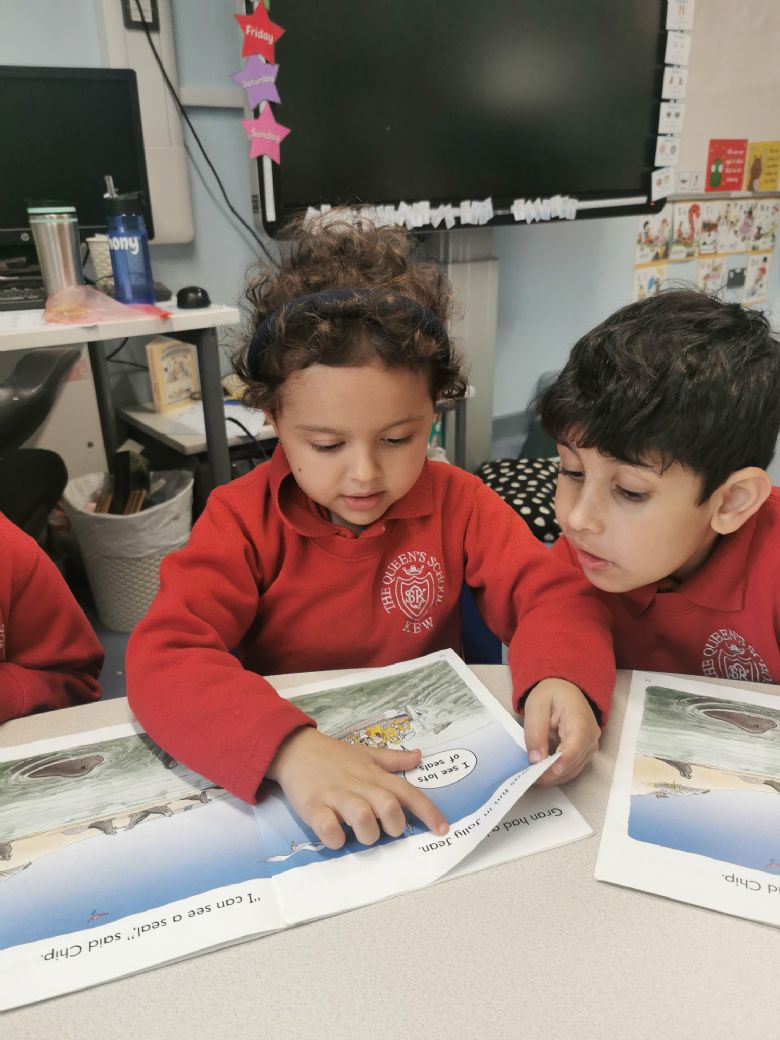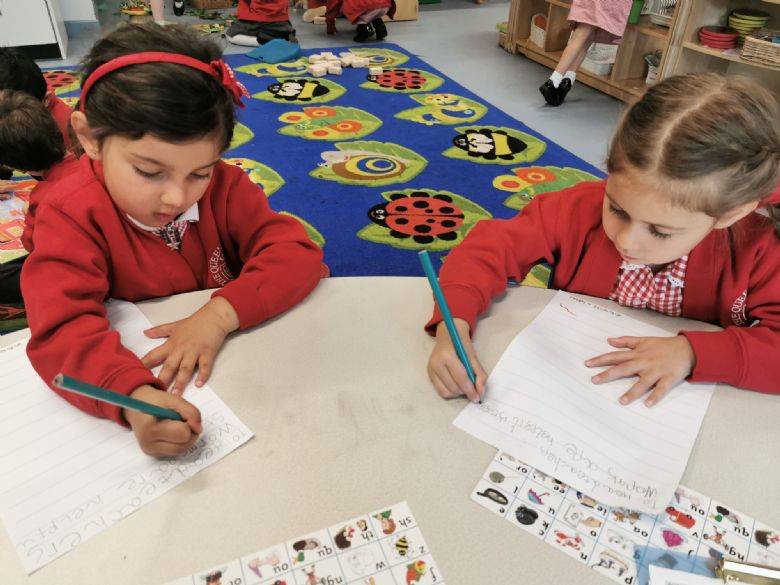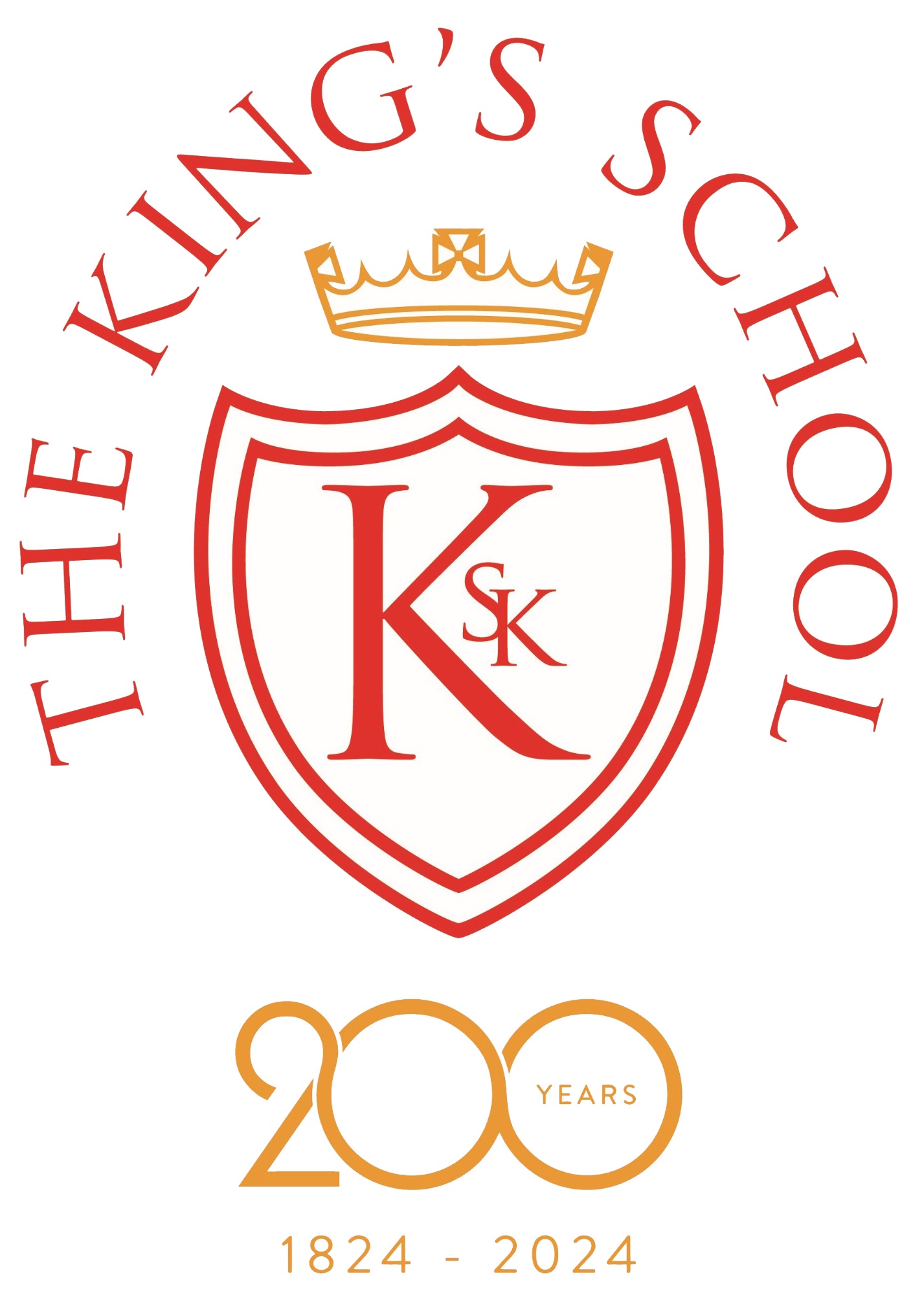Literacy and Phonics
Early reading and writing skills are taught in a range of ways, including focused whole-class learning sessions, small group work and individual reading time, as well as being threaded throughout the rest of the curriculum. As play forms the largest part of the day in Reception, opportunities to develop and apply their reading and writing skills are found across the indoor and outdoor classrooms, with purposeful contexts being provided to motivate and engage the children.
The English text planner below shows the writing skills and outcomes that children in Reception will learn in each half-term along with the books that teachers use to support the learning. We ask that parents do not buy the books until after the half-term they are studied as reading ahead may interfere with the learning journey. Click on the documents to see the knowledge and skills children in Reception are learning.
Phonics
 We use the Jolly Phonics scheme of learning to deliver a comprehensive, fun and multisensory synthetic phonics programme in Reception. Through this, children learn to decode the English language by learning letter sounds (phonemes and graphemes), letter formation, blending (putting sounds together to create a word) and segmenting (identifying the separate phonemes by breaking down the sounds in the word). Children also learn 'tricky words', or words with irregular parts such as 'the' and 'I'.
We use the Jolly Phonics scheme of learning to deliver a comprehensive, fun and multisensory synthetic phonics programme in Reception. Through this, children learn to decode the English language by learning letter sounds (phonemes and graphemes), letter formation, blending (putting sounds together to create a word) and segmenting (identifying the separate phonemes by breaking down the sounds in the word). Children also learn 'tricky words', or words with irregular parts such as 'the' and 'I'.
In Reception, children are taught all 42 letter sounds and are introduced to alternative spellings of vowels as well as the blending and segmenting skills. Phonics sessions are taught daily, with 4 sounds being taught each week alongside tricky words and key reading and writing skills. Steps 1 and 2 of Jolly Phonics are taught between September and Spring, this includes single sounds, digraphs and alternative graphemes. In the Summer term, Reception children review and consolidate Step 2 sounds (digraphs and alternative graphemes).
As well as daily Phonics lessons, group activities and reading & writing through their play, children are read with individually at least once a week. After October half-term, children take at least 1 decodable book and 1 ‘reading for pleasure’ book home each week. The decodable book is specifically targeted at each individual child’s phonic level and the other is chosen by the child to read for pleasure. This 'reading for pleasure' book is for parents/ carers to read to their child, providing them with a language-rich experience and opportunities to practise their predicting, inference and comprehension skills as well as developing ideas and understanding of high-quality text which they will apply in their writing. It is also a great way of modelling those reading skills that children are developing for example segmenting and blending words or identifying and pointing out tricky words. Sometimes an extra book is sent home to work on a specific sound or tricky word that the child may be learning.
Literacy
To enrich and inspire a love of reading and writing, we use high-quality and engaging fiction and non-fiction texts to develop language, imagination and reading & writing skills.
Children in Reception are working towards the Early Learning Goals in Literacy, which are as follows:
Comprehension
- Demonstrate understanding of what has been read to them by retelling stories and narratives using their own words and recently introduced vocabulary;
- Anticipate – where appropriate – key events in stories;
- Use and understand recently introduced vocabulary during discussions about stories, non-fiction, rhymes and poems and during role-play.
Word Reading
- Say a sound for each letter in the alphabet and at least 10 digraphs;
- Read words consistent with their phonic knowledge by sound-blending;
- Read aloud simple sentences and books that are consistent with their phonic knowledge, including some common exception words.
Writing
- Write recognisable letters, most of which are correctly formed;
- Spell words by identifying sounds in them and representing the sounds with a letter or letters;
- Write simple phrases and sentences that can be read by others.
Useful Links:
Jolly Phonics Website:
Here you will find more information on the programme as well as videos detailing the different reading skills and how to help your child with these.
https://www.jollylearning.co.uk/jolly-phonics/#:~:text=Jolly%20Phonics%20is%20a%20comprehensive,as%20opposed%20to%20the%20alphabet.
Get Squiggling
Practise drawing and making different types of marks, this will be really helpful for pre-handwriting skills!
Find Get Squiggling on CBeebies and YouTube
www.youtube.com (search Get Squiggling)
www.bbc.co.uk/tv/cbeebies
Teach Your Monster to Read
A great, free game on the computer that helps your child develop the skills for reading.
https://www.teachyourmonstertoread.com/
Alphablocks
A popular programme that teaches children phonics and the skills for segmenting and blending
https://www.bbc.co.uk/cbeebies/shows/alphablocks
